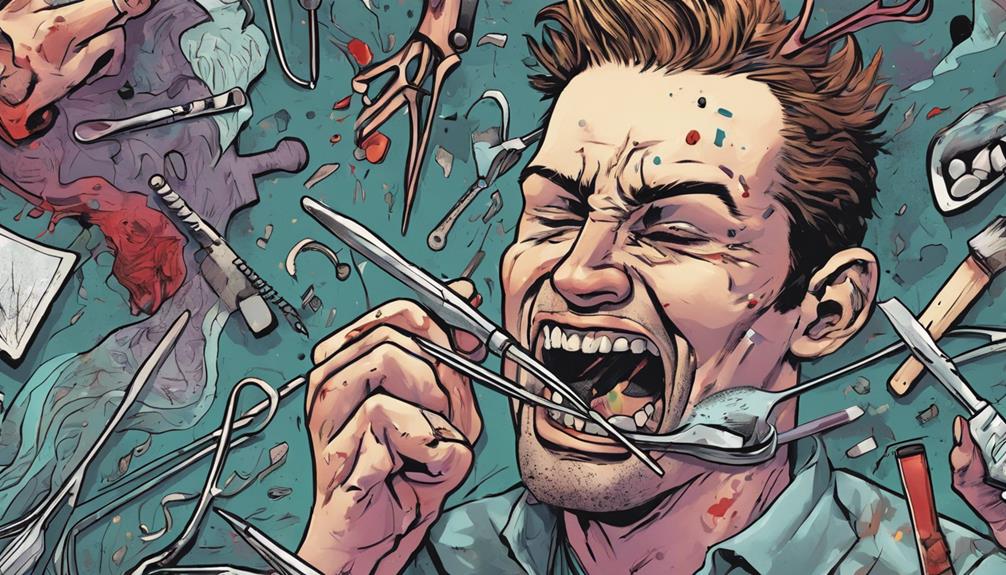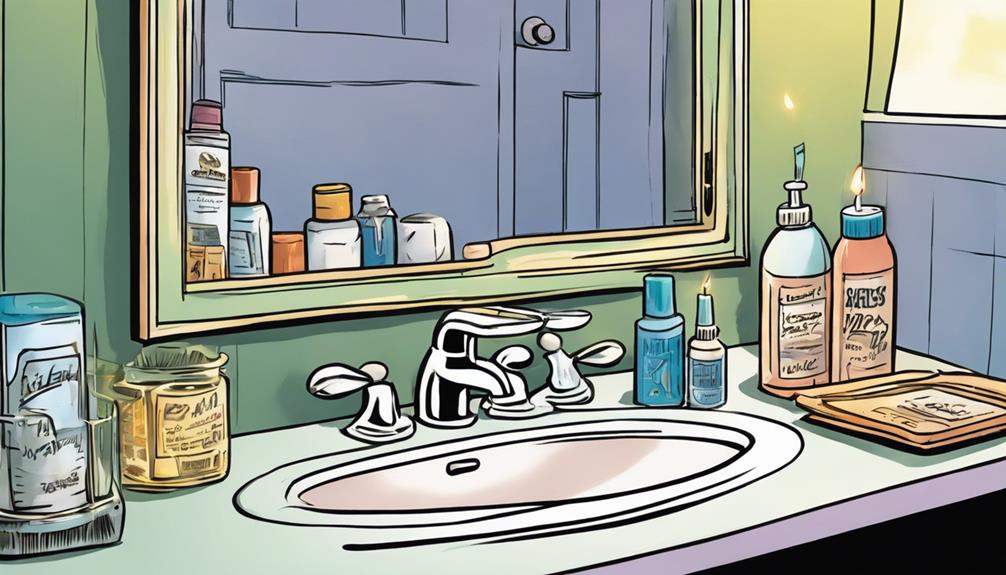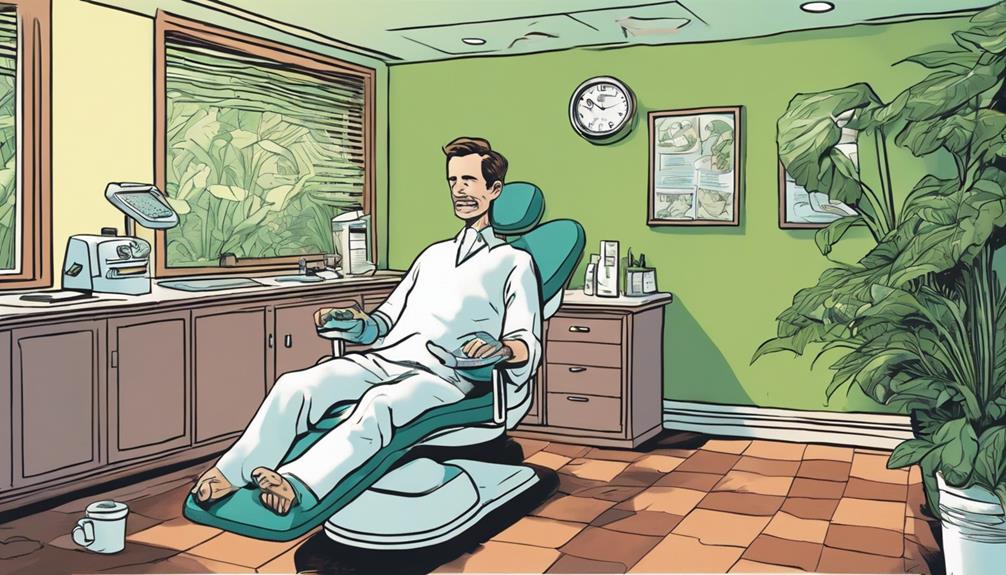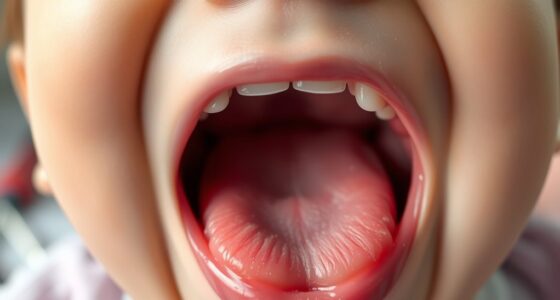Stress affects your dental health more than you might think. When you're stressed, you might neglect your oral hygiene, leading to cavities and gum disease. Chronic stress can also make you grind your teeth or clench your jaw, which damages your enamel. Plus, it can lower saliva production, increasing your risk of dry mouth and decay. Stress often triggers unhealthy eating habits that aren't good for your teeth either. Keeping up with your oral care during stressful times is vital. If you want to uncover some effective strategies for managing stress and protecting your smile, you wouldn't want to miss what's next.
Key Takeaways
- Stress can lead to neglect of oral hygiene, increasing the risk of cavities and gum disease.
- Bruxism, or teeth grinding, is common during stress and can cause tooth wear and jaw pain.
- Chronic stress reduces saliva production, contributing to dry mouth and a higher cavity risk.
- Emotional distress often results in unhealthy eating habits, further increasing the potential for tooth decay.
Understanding Stress and Oral Health

Stress considerably impacts your oral health, making it essential to recognize the connection between the two. When you're under significant stress, you might find yourself neglecting your oral hygiene. This poor oral hygiene can lead to dental problems like cavities and gum disease.
Stress doesn't just affect your routine; it can also trigger bruxism, or teeth grinding, which wears down your teeth and causes jaw pain. Additionally, chronic stress compromises your immune system, making it harder for your body to fight off infections in your mouth. Hormonal changes that accompany stress can reduce saliva production, leading to dry mouth, which further increases the risk of dental issues.
The connection between stress and your oral health is undeniable; when you're feeling overwhelmed, it can directly impact your mouth. Recognizing and managing stress is vital for your overall well-being. By incorporating effective stress management techniques, you can enhance both your mental well-being and your oral health.
The Role of Stress in Dental Issues

Chronic stress greatly contributes to various dental issues, making it even more important to understand its role in your oral health. When you experience stress, your body reacts in ways that can lead to poor oral health. Here are some key points to reflect on: It’s important to recognize the impact of stress on children’s dental health as well. Chronic stress can lead to poor oral habits such as teeth grinding or clenching, which can cause damage to the teeth and jaw. Additionally, children who experience high levels of stress may be more prone to neglecting their oral hygiene, leading to an increased risk of cavities and gum disease. Understanding the relationship between stress and children’s dental health is crucial in promoting overall wellness for young individuals.
Stress can cause bruxism, or teeth grinding, affecting nearly 70% of cases.
Reduced saliva production due to stress results in dry mouth, increasing the risk of cavities.
Emotional stress can trigger painful canker sores, making eating and drinking difficult.
During stressful times, many people neglect their oral hygiene, heightening the chances of developing dental issues.
Stress weakens your immune system, making you more vulnerable to infections and gum disease.
Stress-Induced Behaviors and Dental Impact

Many people don't realize how stress-induced behaviors can severely impact their dental health. When you're under stress, you might unconsciously grind your teeth, a condition known as bruxism. This affects nearly 70% of individuals and can lead to significant tooth wear, jaw pain, and even temporomandibular joint disorder (TMJD).
Additionally, stress can alter your body's hormone levels, reducing saliva production. Saliva plays an important role in maintaining oral hygiene, so when it's scarce, you're at a higher risk for cavities and gum disease.
Emotional stress often prompts unhealthy eating habits, like indulging in sugary snacks, further exacerbating the risk of tooth decay.
When stress takes hold, it's common to neglect your oral hygiene routine. This lack of care can lead to a buildup of plaque and bacteria, increasing the likelihood of cavities and gum disease.
To safeguard your dental health, it's vital to recognize these stress-induced behaviors and their effects on your mouth. By addressing stress and maintaining good oral hygiene, you can help protect your teeth and gums from the damaging consequences of stress.
Importance of Oral Hygiene During Stress

When you're stressed, it's easy to let your oral hygiene slip, but that can lead to serious dental problems.
Keeping up with brushing, flossing, and using mouthwash is vital during tough times to fend off cavities and gum disease.
Stress-Related Hygiene Neglect
Stress often leads you to neglect your oral hygiene, which can have serious consequences for your dental health. When you're overwhelmed, it's easy to overlook essential practices like brushing and flossing, putting you at risk for various issues.
Consider the following:
- Increased risk of cavities due to poor oral hygiene
- Higher likelihood of developing gum disease
- Reduced saliva production, leading to dry mouth
- Unhealthy eating habits that can exacerbate dental issues
This stress-related hygiene neglect weakens your immune response, making it harder for your body to fight off infections, including those affecting your mouth.
With less saliva, your mouth can't effectively cleanse itself or neutralize harmful acids, further increasing your risk of cavities and gum disease.
Furthermore, if you skip dental visits during stressful times, existing issues can go unchecked, leading to more severe consequences down the road.
Prioritizing your oral health is vital, especially when life gets hectic.
Don't let stress dictate your dental care—stay proactive about your hygiene to protect your smile.
Oral Care Strategies
Prioritizing your oral hygiene is essential during tough times to safeguard your dental health and prevent potential issues. Stress can lead to neglect of good oral hygiene practices, but implementing effective strategies can help maintain your oral health.
Here's a quick reference table to keep in mind:
| Strategy | Benefits | Tips |
|---|---|---|
| Brushing and Flossing | Removes plaque, prevents decay | Brush twice daily, floss daily |
| Regular Dental Check-Ups | Early detection of issues | Schedule visits every six months |
| Healthy Diet | Reduces risk of tooth decay | Focus on fruits, vegetables, and water |
| Stress Management Techniques | Lowers stress, protects teeth | Try meditation, exercise, or hobbies |
| Nightguard Use | Prevents damage from grinding | Consult your dentist for a custom fit |
Managing Stress for Better Oral Health

Effective stress management can play an essential role in maintaining your oral health and preventing dental issues. When you effectively manage stress, you're likely to practice good oral hygiene habits, which can keep your teeth and gums healthier.
Here are some strategies to take into account:
- Practice meditation or mindfulness to calm your mind.
- Engage in regular physical activity to reduce stress levels.
- Incorporate deep breathing exercises to help manage anxiety.
- Stay hydrated to support saliva production.
Chronic stress can lead to neglecting your oral care routine, increasing your risk of cavities and gum disease.
Additionally, stress can cause hormonal changes that reduce saliva production, resulting in dry mouth. This condition makes it harder for your mouth to neutralize acids and cleanse oral surfaces, putting your dental health at risk.
By managing stress effectively, you can improve your oral health, reduce the likelihood of teeth grinding, and guarantee you stay committed to your dental care regimen.
Prioritize stress management, and watch your smile thrive!
Professional Help for Stress-Related Dental Problems

Maintaining your oral health during stressful times often requires professional help to address issues like gum disease and bruxism. Regular dental visits are essential for monitoring stress-related dental issues that can arise when stress levels are high. Your dentist can provide personalized advice tailored to your unique situation, helping you manage both your oral health and mental health.
If you're experiencing teeth grinding, your dentist might recommend custom nightguards to protect your teeth and jaw from damage. These treatments not only safeguard your dental structure but also reduce discomfort associated with stress-induced bruxism. Additionally, dental professionals can educate you on the connection between stress and oral health, empowering you to take proactive steps in maintaining your hygiene.
It's also worth considering that addressing any underlying mental health challenges, like anxiety or depression, can enhance your adherence to oral hygiene practices. This holistic approach combines both dental and mental health care, ultimately reducing the impact of stress-related dental issues.
The Connection Between Mental Health and Oral Care

Your mental health plays a significant role in your oral hygiene habits, and when you're feeling anxious or depressed, you might skip brushing or avoid dental visits altogether.
This neglect can create a cycle where poor oral health worsens your mental well-being, making it even harder to care for your teeth.
Understanding this connection can help you take proactive steps towards both your mental and dental health.
Mental Health Impacts Hygiene
Mental health challenges like depression and anxiety often lead to neglecting oral hygiene, which can spiral into serious dental issues. When you're feeling overwhelmed, maintaining your oral care routine might be the last thing on your mind, but it's vital for your overall health.
Stress can trigger unhealthy eating habits, contributing to cavities and tooth decay. Poor oral health can worsen anxiety and depressive symptoms, creating a vicious cycle. Individuals with dental problems are less likely to seek treatment due to anxiety about visiting the dentist. Neglecting oral hygiene can lead to gum disease, which affects your mental well-being. Regular dental check-ups can greatly improve your mood and quality of life.
Taking care of your oral hygiene may not seem connected to your mental health, but it truly is. When you prioritize brushing and flossing, you're not just preventing cavities; you're also fostering a sense of control and well-being. By addressing your dental health, you can help break the cycle of stress and poor oral health, leading to a brighter and healthier smile.
Stress and Dental Avoidance
Dental avoidance often stems from stress and anxiety, leading to a detrimental cycle that impacts both oral and mental health. If you find yourself skipping dental visits due to stress, you're not alone. Many people experience heightened fears around dental care, which can worsen your oral hygiene and lead to cavities and gum disease.
Here's a quick look at how stress affects dental care:
| Impact of Stress | Resulting Oral Health Issues | Mental Health Effects |
|---|---|---|
| Increased anxiety | Avoidance of dental visits | Heightened feelings of depression |
| Neglecting oral hygiene | Higher risk of cavities | Lower self-esteem |
| Fear of dental procedures | Worsening dental conditions | Increased isolation and anxiety |
Bidirectional Health Relationship
The connection between mental health and oral care reveals how neglecting one can greatly impact the other, creating a cycle that hinders overall well-being.
Mental health issues can lead to poor oral hygiene. Increased stress may cause teeth grinding and jaw clenching. Unhealthy eating patterns often accompany emotional distress. Dental problems can worsen mental health conditions. Regular dental visits can improve your mood.
This bidirectional relationship means that when you experience stress or depression, you might neglect your oral health, increasing the risk of cavities and other dental problems. Conversely, poor oral health can exacerbate feelings of anxiety and depression, making it even harder to maintain good hygiene.
You might find that emotional distress leads to unhealthy eating habits, contributing to tooth decay. Additionally, stress can result in bruxism, further damaging your teeth.
Recognizing this cycle is essential. By prioritizing your oral health, you can potentially alleviate some mental health issues and break free from this detrimental cycle. Taking care of your hygiene isn't just about your smile; it's an important part of your overall mental well-being.
Nutritional Considerations for Stress Management

A balanced diet packed with fruits and vegetables can effectively help you manage stress while supporting your overall health. Incorporating omega-3 fatty acids from sources like salmon and walnuts can reduce inflammation and improve your mood, making stress management easier. Additionally, magnesium-rich foods such as spinach, nuts, and whole grains promote relaxation, which benefits both your mental state and oral health.
It's also vital to keep your sugar intake in check. High-sugar diets can lead to blood sugar spikes and crashes that negatively impact your mood and increase anxiety. By limiting sugar, you can maintain a steadier emotional state and avoid unnecessary stressors.
Don't forget the importance of staying hydrated. Drinking plenty of water helps produce saliva, which is essential for oral health, especially if you're experiencing stress-related dry mouth. A well-hydrated body supports overall well-being and helps mitigate the physical effects of stress.
Community Support and Dental Health Awareness

Community support plays an essential role in raising awareness about the importance of oral health and its connection to overall well-being. When communities come together, they can foster a culture of preventive care that prioritizes both dental health and stress management.
Local health campaigns educate you on the link between stress and oral health.
Family-friendly dental environments help reduce anxiety for kids, promoting lifelong oral hygiene routines.
Positive patient testimonials build trust in dental care providers, encouraging everyone to seek necessary treatments.
Collaborative efforts between dental professionals and community organizations provide resources for maintaining ideal oral health.
Engaging community initiatives enhance awareness of the importance of oral health, leading to better prevention and treatment outcomes.
Frequently Asked Questions
How Does Stress Affect Dental Health?
Stress impacts your dental health by reducing saliva, leading to dry mouth and increased cavities. It can also cause teeth grinding, weaken your immune system, and encourage unhealthy eating, all of which heighten dental issues.
Can You Reverse Bad Dental Hygiene?
Absolutely, you can reverse bad dental hygiene. Think of it like turning back time; by brushing, flossing, and visiting the dentist regularly, you'll restore your smile and reclaim your oral health effectively.
What Are Signs of Poor Oral Hygiene?
You'll notice signs of poor oral hygiene like persistent bad breath, bleeding gums, tooth sensitivity, visible cavities, and swollen gums. These symptoms indicate neglect and require your immediate attention to improve your dental health.
How Your Teeth Can Show if You're Stressed?
Your teeth can show stress through signs like increased wear, jaw pain from grinding, and sensitivity. You might notice more cavities or gum issues, indicating that stress is affecting your oral health and hygiene habits.
How Does Your Diet Affect Your Stress Levels and Dental Health?
A healthy diet can positively impact your stress levels and dental health. Consuming a diet rich in fruits, vegetables, and lean protein can help reduce stress and promote good oral health. On the other hand, a diet high in sugar and processed foods can increase stress and negatively affect dental health. Understanding the impact of diet is crucial for overall well-being.
Conclusion
You might think that stress and dental health are unrelated, but they're more connected than you realize. Ignoring the impact of stress on your teeth can lead to serious issues down the line.
By managing your stress and prioritizing your oral hygiene, you can protect your smile and your overall well-being. Don't wait until it's too late—take charge of your health today.
Remember, a healthier you starts with a happier mind and a brighter smile!









